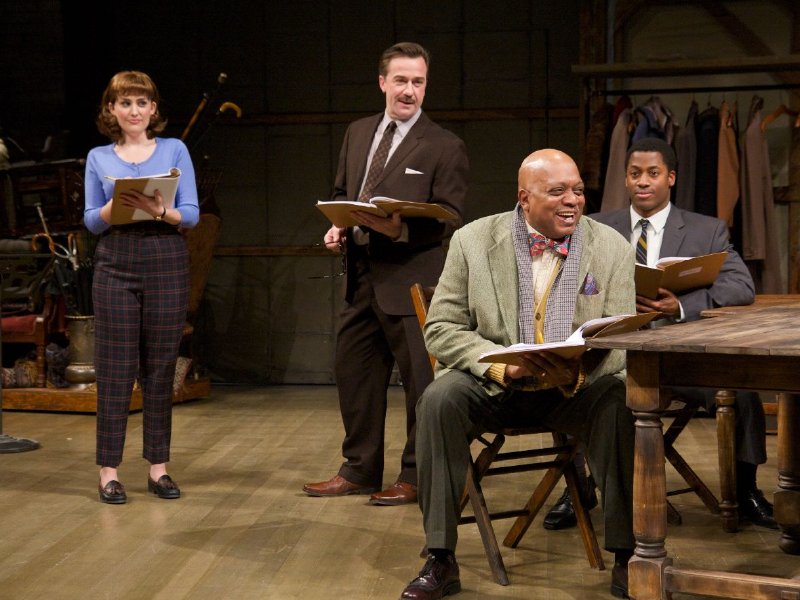Through the spring and summer of 2005, August Wilson was rewriting the final play of his spectacular 10-drama cycle devoted to African-American life in the 20th century.
"Radio Golf" had been given its world premiere by the Yale Repertory Theatre in April, and the playwright decided it needed major revisions for an August production at the Mark Taper Forum in Los Angeles.
Dying of liver cancer, Wilson would not experience the momentous events of 2008 -- the dangerous decline of the national economy and the election of a bi-racial man like him to the presidency.
Wilson could not have anticipated that the new play demanding his time and energy in his final months of life would ultimately resonate with such universal truth. "Radio Golf" is not the greatest play in the Wilson cycle, but it is his most relevant, speaking to everyone about American values at this point in history.
The Milwaukee Rep opened a production of the piece last weekend.
"Radio Golf" is stylistically quite different from the rest of the Wilson cycle. The rich and poetic patois of African-American dialogue that runs through the other plays is largely absent, a sign of the times and a negative metaphor for what has been lost in a black community that is being split between the haves and the have-nots.
It is 1997 in the playwright's native Pittsburgh, and the traditionally African-American neighborhoods are being cleared for redevelopment. The potential for making big money looms over the area, and "Radio Golf" centers on a couple of energetic black business partners who hope to cash in.
Harmond Wilks is simultaneously attempting to run for mayor and steer a large real estate venture through the governmental bureaucracy. His former college buddy and present project colleague, Roosevelt Hicks, is as obsessed with playing golf as he is with protecting his Saab from harm in the old ‘hood. Wilks' wife, Mame, is following a career path of her own, on the short list to become the governor's press spokesperson.
The good life appears to have arrived in a community that suffered more than a century of poverty and prejudice. The development deal Wilks and Hicks are pursuing features a Starbucks, Whole Foods and a Barnes & Noble.
But this rosy picture cannot obscure some inconvenient facts. Not everyone in the community has been swept along on the rising tide of prosperity. There are still people scratching and scraping to get by in the manner of previous generations, and they carry with them the traditions and touchstones of African-American survival.
The dramatic conflict in "Radio Golf" addresses gentrification, and it asks whether the poor and the past can be justifiably bulldozed in the service of profits and progress. The issue comes into sharp focus when a ramshackle house that has profound significance for the neighborhood stands in the way of the proposed development.
On one side of the argument is an I-gotta-have-my-Lexus attitude that trumps the interests of the community. Since Wilson died, we have discovered that a large segment of corporate America has adopted that position, with top executives awarded soaring compensation while they slash payrolls and shrink employee benefits.
The arrogance of affluence that threatens to poison Pittsburgh's black neighborhoods in the play has become reality in the national neighborhood we all share. The sense of the public good has evaporated. August Wilson was more of a prophet than he probably ever dreamed.
The Rep production of "Radio Golf" appeared to not be quite ready for prime time on opening night. The three actors playing the leads -- Tyrone Mitchell Henderson, Howard W. Overshown and Kelly Taffe -- were surprisingly stiff. That condition lessened a bit as the production progressed through its two acts.
William C. Mitchell and Doug Brown, portraying neighborhood characters who are a bridge to Wilson's earlier works, were spot on from the start. "Radio Golf" continues through March 28.
The Rep's Next Season
In choosing British director Mark Clements as its next artistic director, the Rep signaled an intention to make substantive changes in its creative product. The extent of the change became evident this week with the announcement of the company's 2010-2011 season.
The Quadracci Powerhouse Theater will begin the season with the Rep's first main stage musical in 31 years, the Kander and Ebb classic "Cabaret." The company is trimming a production from both its Powerhouse and Stiemke Theater series, and is compensating for that with longer runs of some shows.
Look for a detailed analysis of the upcoming Rep season in next week's column.
A Chatty Sondheim
Stephen Sondheim turns 80 in 11 days, and 2010 is being treated as a celebratory year with a variety of featured Sondheim events in this country and England. Among the programs is a Sondheim conversation tour that has him appearing with different questioners in front of large audiences in a series of cities.
He was in Chicago last week, chatting with director Gary Griffin and looking more like 60 than 80. Sondheim was full of energy and good cheer, and very willing to reminisce. Ethel Merman was the subject of several stories, and Zero Mostel and Elaine Stritch also received anecdotal attention.
Sondheim spoke a lot about legendary lyricist and librettist Oscar Hammerstein II, offering the opinion that he is not recognized for his greatest contribution to theater as an experimental playwright. Hammerstein is credited with developing the book musical and moving musical theater into weighty topics.
Oscar had a son, Jimmy, who was Sondheim's age, and when Sondheim's parents divorced, the Hammersteins, who were neighbors, became his surrogate family. Sondheim became interested in writing musicals as a teenager, and Hammerstein mentored him. "I wanted to be like Oscar," Sondheim said.
Here are a few tidbits from the 90-minute conversation in Chicago:
A 25-year-old Sondheim was not eager to pen the lyrics to Leonard Bernstein's score for "West Side Story" because he wanted to be a composer-lyricist, writing his own music. Hammerstein told him to take the job, and he did.
Ethel Merman wouldn't agree to Sondheim composing the music for "Gypsy" because she considered him only a lyricist. Jule Styne wrote the songs, and Sondheim the lyrics.
The first Broadway show Sondheim saw was "The Boys From Syracuse," when he was 6. He didn't become interested in theater until he was a teenager. "I was brought up on movies," he said.
Sondheim has lived his entire life in a 20 square block area of Manhattan.
Sondheim was thinking of Joan Crawford while he wrote the show stopping number "I'm Still Here."
Muppets man Jim Henson was going to make a movie version of "Into the Woods." His sudden death in 1990 ended the project.
Director and choreographer Jerome Robbins "is probably the only genius I have known," said Sondheim.
We haven't seen and heard a new Sondheim musical in a while because he has been working on the new revue of existing material, "Sondheim on Sondheim," which begins preview performances in New York this month, and he has been writing a two-volume compilation of all his lyrics with extensive commentary.
With that project near completion, Sondheim said he is beginning to think about new work. "I'm nibbling on two things," he reported.
Damien has been around so long, he was at Summerfest the night George Carlin was arrested for speaking the seven dirty words you can't say on TV. He was also at the Uptown Theatre the night Bruce Springsteen's first Milwaukee concert was interrupted for three hours by a bomb scare. Damien was reviewing the concert for the Milwaukee Journal. He wrote for the Journal and Journal Sentinel for 37 years, the last 29 as theater critic.
During those years, Damien served two terms on the board of the American Theatre Critics Association, a term on the board of the association's foundation, and he studied the Latinization of American culture in a University of Southern California fellowship program. Damien also hosted his own arts radio program, "Milwaukee Presents with Damien Jaques," on WHAD for eight years.
Travel, books and, not surprisingly, theater top the list of Damien's interests. A news junkie, he is particularly plugged into politics and international affairs, but he also closely follows the Brewers, Packers and Marquette baskeball. Damien lives downtown, within easy walking distance of most of the theaters he attends.







